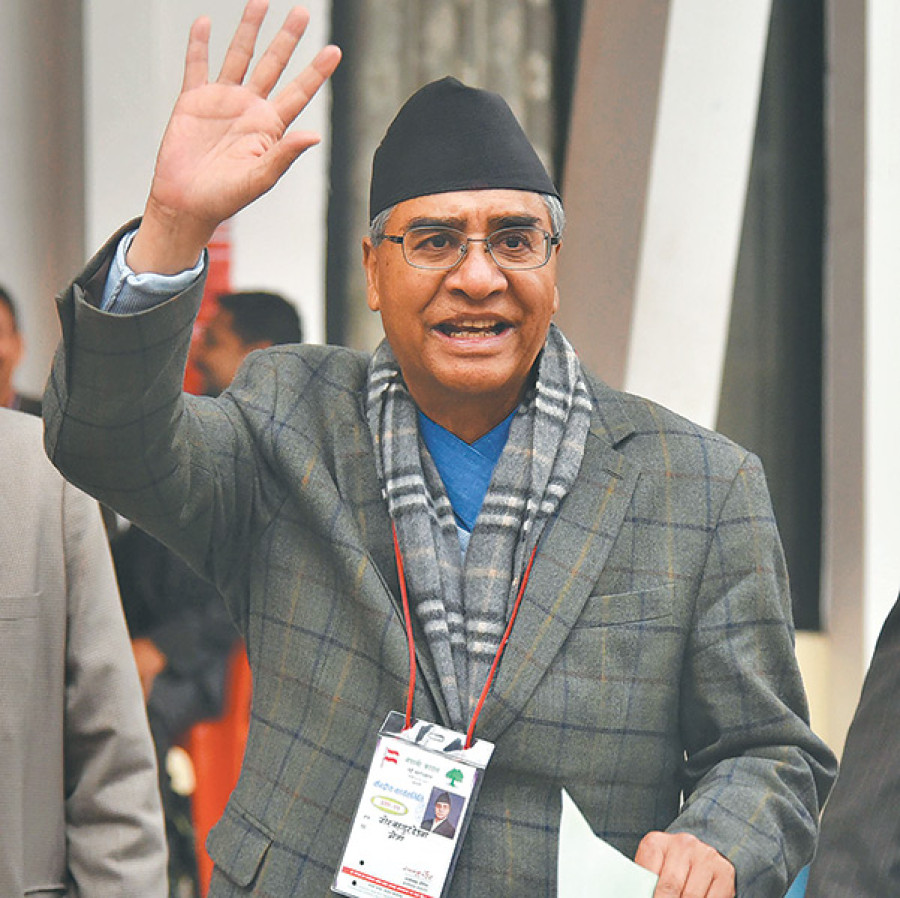Opinion
Deuba’s advantage
Nepal is in dire need of leaders who preach and practise reconciliation rather than divisiveness
Jainendra Jeevan
Sher Bahadur Deuba, president of the largest party in Parliament, the Nepali Congress, has for the fourth time assumed the post of prime minister of this country within a time span of 22 years. Deuba has been repeatedly tried and tested, and he has repeatedly failed. He is once again in charge, thanks to the hybrid electoral system and dirty party politics that has converted the high office of prime minister into a game of musical chairs played between a few oligarchs. If the Nepali people were free to directly choose their executive chief, they would hardly have voted for Deuba even for a second time, let alone fourth. They would have voted on the basis of the candidates’ merit and their policies. That Deuba, despite his failures, yet again seems to be the most appropriate person capable of safe landing our troubled nation indicates how unfortunate we are. Given the complexities of the delicate and protracted political transition, his chances of success will depend on several variables—internal as well as external, and seen as well as unseen. Here we discuss why and how Deuba is most suited for this role.
Long-term political and developmental goals of the country are not Deuba’s cup of tea. Nation-building doesn’t figure in his agenda. He isn’t concerned about how he will be judged in the annals of history; he cares about power, not posterity. Other politicians aren’t saints either, but Deuba makes every possible compromise to gain power. And, fortunately or unfortunately, his acumen of political compromise has been an asset both for him and the country, because Nepal is in dire need of leaders who preach and practise reconciliation rather than divisiveness. After centuries of poverty and decades of conflicts that were hardly justifiable and damaged everything from peace and people’s well-being to the country’s social fabric and the economy, any kind of conflict is the last thing Nepali people want. They yearn for peace and prosperity.
Best among the lot
No leader other than Deuba is flexible enough to make deals with different regional or ethnocentric groups and political parties, including the ones which may stir up agitations of one kind or another. For instance, the Madhesi parties that have been agitating time and again in the restive region of the Tarai don’t see eye to eye with the leader of the opposition and ex-PM KP Sharma Oli. Unless Oli mends his ways and views—which are pathological and thus difficult to change—his accession to premiership, if and when it happens, will only further alienate Madhesi communities and provoke them to agitate. Pushpa Kamal Dahal, leader of the ruling alliance and another ex-PM, is flexible, but his party—the third largest in Parliament—lacks the strength to make any deals on its own. And he has just stepped down from premiership following an agreement with the NC. Other parties are too small to aspire for the post of PM.
Ram Chandra Poudel, Deuba’s comrade-in-arms in the NC and arch-rival in the succession line, doesn’t have the support of an adequate number of parliamentarians. As Deuba is more popular among party members, Poudel’s chances of being PM are slim. Powerful external and geo-political forces also find Deuba more suited to the post of PM than Poudel, and for that matter, Oli and even Dahal. A leader with average intellectual calibre but strong common sense, Deuba doesn’t speak much in public, most likely to avoid controversies. By contrast, Oli and Dahal often inflict troubles upon themselves by speaking too much in public. Deuba may not care about prudent and long-term solutions, but he is a master at defusing crises in the short-term. Rather than dealing with groups, in which case stakeholders mostly take a tougher position, he deals with people on a one-to-one basis, in which he privately offers them what they need. And, more often than not, he emerges successful.
Change your ways
Deuba has made several historical mistakes. To cut a long story of his blunders short, he nurtured political corruption to remain in power. He split his party to further his political ambitions, which subsequently backfired. To settle scores with Girija Prasad Koirala, the then NC party president, Deuba formed ties with the then king Gyanendra and encouraged him to become politically active, which triggered a backlash. Deuba never cared for anything beyond his personal and political interests and he never pondered about existing or potential fault lines, such as the Maoist rebellion. Partly as a result of his unpreparedness and lax response towards the Maoist demands/threats, the country had to bear a cruel and bloody insurgency that inflicted heavy losses of life and property for 10 long years. Deuba’s apologists argue that this is history now. They say that, as somebody who suffered the consequences of those blunders more than anybody else, Deuba has learnt a great deal and he will be careful not to make the same mistakes.
However, there is little reason to share their optimism, if some of Deuba’s recent acts are anything to go by. He used all his power to promote a person of dubious integrity to the chief of the police force. When the SC forbade him from doing so, he tried, albeit in vein, to impeach an honest and popular chief justice of the apex court. He succeeded in appointing unscrupulous manpower suppliers as Nepal’s ambassadors to foreign countries, against whom several petitions/criminal cases were pending. When opposition parties, media and civil society groups condemned these acts, Deuba chose, as usual, to remain silent. He neither apologised nor defended his actions. It may be extremely difficult to change, but change Deuba must, if he does not want to be a spent force. Change your ways Deuba, as you are still useful for the nation.




 9.89°C Kathmandu
9.89°C Kathmandu










